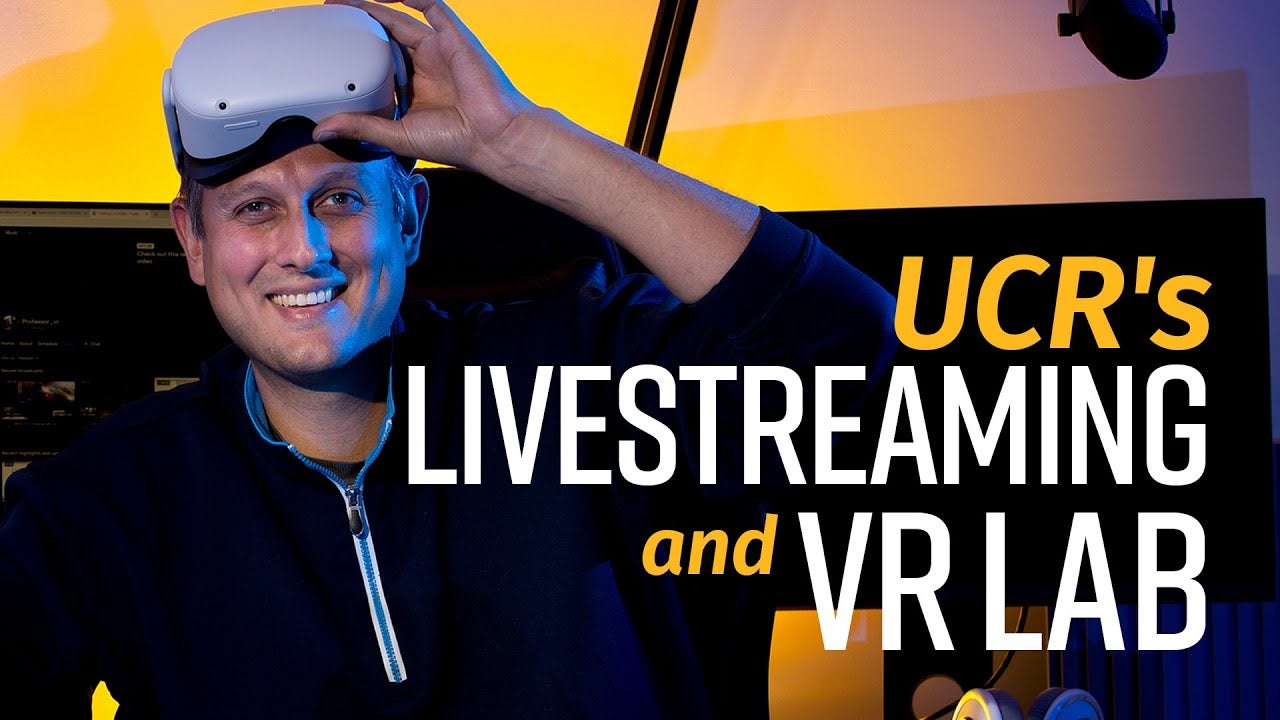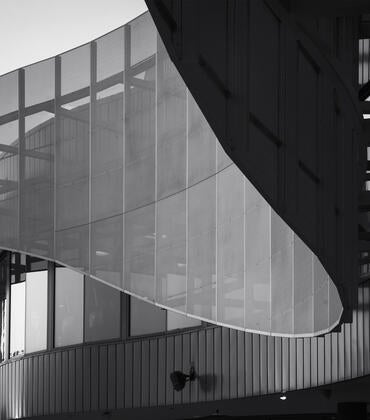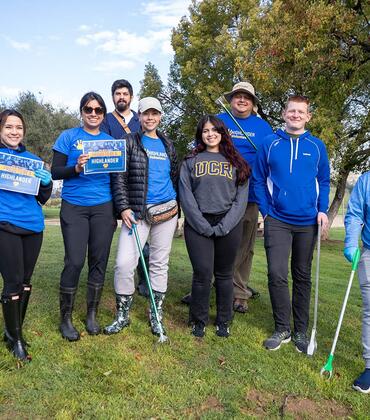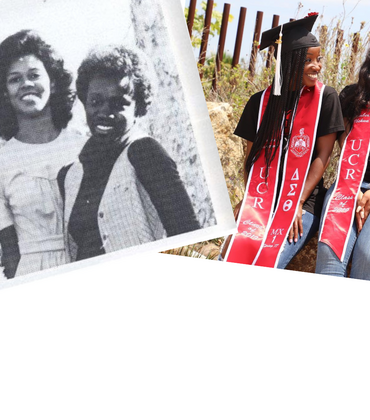As the world moves increasingly online, the line between physical and virtual reality has become more and more blurred. But with the high cost of current VR technologies, few have the opportunity or access to experience these digital worlds themselves. With that in mind, Ilya Brookwell, an assistant professor of media and cultural studies, founded the new Livestreaming and Virtual Reality Research Lab at UC Riverside — the first of its kind for the campus.
Housed within UCR’s Department of Media and Cultural Studies, the lab was established by Brookwell in early 2020 as a means of providing students studying gaming and online communities the opportunity to experience the virtual worlds forming some of their research firsthand.
“It takes what our students are learning on the page, and it makes it real,” said Brookwell, who is known as “Professor VR” by his students. “It serves as a portal to many different worlds that our students will get to go to now in class.”
The lab is host to a series of lower and upper division courses open to students across the campus, with over 330 students making use of the facility so far to advance their studies in video game studies, live-video politics, online research methods, and virtual reality studies. Brookwell, whose research centers on video gamers, livestreaming, and online communities, said the lab will further advance research methodologies and provide new avenues of inquiry in the field of gaming studies.
“For a very long time, we studied gaming from a theoretical perspective, sometimes visiting gamers in their home or going to events to interview them,” he said. “Being able to actually go into the game and into the world is a real opportunity for research that didn’t exist before. You’re not writing about something in the abstract — you’re reporting on what your actual experiences are.”
The lab currently offers a variety of equipment including Oculus Quest 2, Vive Pro, and Valve Index headsets, and three terminals where students will be able to experience virtual reality and livestream their experiences on platforms including Facebook, YouTube, and Twitch. Along with advancing students’ access to VR, a major goal of the lab is to make VR more accessible to society at large.
“A tiny percentage of the population ever gets a chance to experience VR, and what our lab aims to do is stream those experiences and share them with a wider audience, akin to a radio station,” Brookwell said. “We’re opening it up to our students and our research partnerships, but ultimately, we hope also to bring it to the public. We’re democratizing virtual reality.”
Due to the pandemic, students have yet to make full use of the lab, but in the interim, Brookwell has used it as an opportunity to create what he calls the “Virtual Reality School,” noting that while many schools have successfully adapted to remote work, the pandemic has also revealed some of the pitfalls of online learning, including a lack of social interaction and increased isolation. In response, Brookwell has been using the lab as a means of creating a more immersive learning experience.
Using the lab equipment, Brookwell can bring his students into virtual worlds through open-source software including Google Earth VR and VRChat by livestreaming his VR experiences to their screens. Students are also able to chat and interact with Brookwell and other students as they move through the VR worlds and discuss lecture topics. A recent class brought students back into a lecture hall with Brookwell teaching from a virtual whiteboard as Dr. Who.
“When I’m talking about violence in video games, I can go to a location in Google VR and stand on the street of a city in a place that I’m talking about, so we’re not just sitting on a Zoom call doing a seminar discussion,” he said.
A UC-wide VR course open to students from all campuses is also being considered for the future.
“Online education is seen as a roadblock to many, but there are tremendous opportunities when you create a virtual reality school including expanding and scaling enrollment,” he said.
Students will also be able to learn technical skills through the lab including using VR technologies, sound engineering, and video production. Brookwell is also partnering with several VR media studios and other organizations interested in various VR applications where students will be able to collaborate on projects, gain industry experience, and secure internship and work opportunities.
One such project is already underway. Building on ethnographic data and research developed in partnership with Coventry University, the lab will be used to help develop a prototype of a virtual reality museum exhibit centered on medical implantation and the experiences of those living with various medical implants. The lab is also partnering with UCR ARTS to develop the project and potentially house the future exhibit.
“We’re trying to create a VR experience through interviews and careful design that helps to educate surgeons, students, outpatients, and other scholars about the full process,” Brookwell said. “These kinds of VR experiences can build practical bridges within institutions that don’t normally overlap.”
Brookwell said the department hopes to scale the lab’s capabilities by offering more equipment, including large-format displays and a class set of VR headsets, so every student can experience and interact in virtual worlds together. He also plans to make the lab mobile, allowing students to set up VR experiences and video production from anywhere. As VR technologies continue to evolve, Brookwell hopes the lab will serve as an incubator for novel digital applications and expand opportunities for immersive learning and experiences.
“Ultimately, we hope to strike a balance between training and education, and to be at that cutting edge of VR,” he said. “The possibilities are endless.”
Header Photo: (UCR/Stan Lim)




